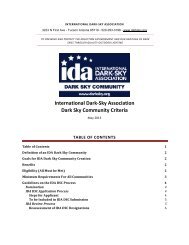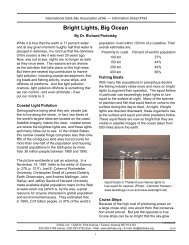Light Pollution — Theft of the Night - International Dark-Sky ...
Light Pollution — Theft of the Night - International Dark-Sky ...
Light Pollution — Theft of the Night - International Dark-Sky ...
Create successful ePaper yourself
Turn your PDF publications into a flip-book with our unique Google optimized e-Paper software.
<strong>International</strong> <strong>Dark</strong>-<strong>Sky</strong> Association (IDA) <strong>—</strong> Information Sheet #90<br />
<strong>Light</strong> <strong>Pollution</strong> <strong>—</strong> <strong>Theft</strong> <strong>of</strong> <strong>the</strong> <strong>Night</strong><br />
I. Introduction: Have you looked up at night<br />
lately? The universe is going away, gone already<br />
for many. The universe is an important part <strong>of</strong><br />
<strong>the</strong> environment, to astronomy and to <strong>the</strong> general<br />
public.<br />
For most people on earth, <strong>the</strong> dark skies our<br />
ancestors had have disappeared. The problem is<br />
urban sky glow, due mostly to too much bad lighting.<br />
With good lighting, we all win. We help preserve<br />
<strong>the</strong> dark skies, we see better (and are safer<br />
and more secure), we have a more pleasant and<br />
comfortable nighttime environment, and we save a<br />
great deal <strong>of</strong> energy and money doing so. Nei<strong>the</strong>r<br />
astronomers nor <strong>the</strong> public, anywhere, need any <strong>of</strong><br />
<strong>the</strong> adverse environmental effects <strong>of</strong> poor lighting.<br />
II. Why night lighting? To see at night, for security,<br />
safety, utility, and for an attractive nighttime<br />
environment around us. But not all lighting is good<br />
lighting.<br />
III. What are <strong>the</strong> adverse impacts <strong>of</strong> poor nighttime<br />
lighting?<br />
A. Urban sky glow (<strong>the</strong> brightening over our<br />
heads), destroying our view <strong>of</strong> <strong>the</strong> universe.<br />
We don’t live up <strong>the</strong>re in <strong>the</strong> sky; we don’t need<br />
all that light up <strong>the</strong>re.<br />
B. Glare. Glare never helps visibility, but it is far<br />
too common in all our cities. We should strive<br />
for a glare free environment.<br />
C. <strong>Light</strong> trespass. Many present lighting installations<br />
bo<strong>the</strong>r us much more than <strong>the</strong>y help.<br />
The wasted light shines into our yards, our<br />
windows, even our telescope buildings. As with<br />
noise pollution, we don’t need any <strong>of</strong> this bad<br />
light.<br />
D. A trashy looking, confusing nighttime environment.<br />
We should, all <strong>of</strong> us, be striving for<br />
a good looking nighttime environment, just as<br />
we should be doing in <strong>the</strong> daytime. Such poor<br />
© IDA, Inc. • 3225 N. First Avenue • Tucson, Arizona 85719-2103<br />
520-293-3198 (voice) • 520-293-3192 (fax) • Web: www.darksky.org • E-mail: ida@darksky.org<br />
1<br />
environments are part <strong>of</strong> <strong>the</strong> stress <strong>of</strong> today’s<br />
life. We should help with <strong>the</strong> problem, not compound<br />
it. Remember, <strong>the</strong> night is part <strong>of</strong> <strong>the</strong><br />
environment too.<br />
E. Human Health and Ecology. Recent<br />
research has made it clear that we must take<br />
into account <strong>the</strong> fact that electric lighting affects<br />
more than vision. There are numerous photobiological<br />
aspects to light, with both positive<br />
and negative impacts on humans and on <strong>the</strong><br />
ecosystem.<br />
F. Energy waste. We waste an astronomical<br />
amount <strong>of</strong> energy and money by all this bad<br />
lighting, shining it where it is not needed nor<br />
wanted (including up into <strong>the</strong> sky) and by using<br />
energy ineffi cient light sources and lighting<br />
designs. Better to use such money for improving<br />
our world, not mucking it up.<br />
We all suffer from <strong>the</strong>se problems. But we need<br />
not.<br />
IV. So what to do?<br />
A. Use good lighting. Such quality designs are<br />
really all just common sense approaches to<br />
lighting. Let’s not tolerate all <strong>the</strong> bad lighting;<br />
let’s get rid <strong>of</strong> it.<br />
B. Shine <strong>the</strong> light down, where it is needed.<br />
Control <strong>the</strong> light output to locations where it<br />
is needed; don’t waste it. Use quality lighting<br />
fi xtures.<br />
C. Use time controls (or dimmers or o<strong>the</strong>r controls)<br />
to insure that light is <strong>the</strong>re when needed,<br />
and not <strong>the</strong>re when it is not.<br />
D. Design and install lighting to insure that<br />
glare is minimized. Most all glare comes from<br />
poor fi xtures or poor installations. There is no<br />
need for any <strong>of</strong> it.<br />
E. Use <strong>the</strong> right amount <strong>of</strong> light for <strong>the</strong> task,<br />
not overkill. “More light” is not <strong>the</strong> approach<br />
to use. When not blinded by glare, <strong>the</strong> eye<br />
is a marvelous instrument and can see very<br />
well at what seems to be quite low lighting continued<br />
03/05
levels. In addition, going from over lit areas to<br />
darker areas means that we don’t see too well<br />
(transient adaptation), and <strong>the</strong> opposite holds<br />
as well.<br />
F. Use energy effi cient light sources, <strong>Light</strong><br />
sources vary greatly in <strong>the</strong>ir effi ciency. Consider<br />
especially <strong>the</strong> use <strong>of</strong> low pressure sodium<br />
lamps; <strong>the</strong>y are most effi cient <strong>of</strong> all, and <strong>the</strong>y<br />
are also strongly preferred by astronomers as<br />
<strong>the</strong> light output by LPS is essentially all<br />
one color and can be fi ltered out quite<br />
well. LPS is excellent for street lighting,<br />
parking lots, security lighting, and o<strong>the</strong>r<br />
applications where color rendering is not critical.<br />
Careful lighting design can be done<br />
using LPS for essentially any application.<br />
V. It all works! Such quality lighting design has<br />
been used for some time now in many locations.<br />
Such cities are benefi tting by better lighting for<br />
<strong>the</strong>ir citizens, by a great deal <strong>of</strong> energy savings,<br />
and by darker skies (but not darker streets). We all<br />
really do win.<br />
One way to effectively begin is for cities to<br />
appoint an Outdoor <strong>Light</strong>ing Working Group to consider<br />
<strong>the</strong> issues and to recommend specifi c solutions<br />
(including lighting control ordinances) tailored<br />
to local needs. Such “committees” have been<br />
quite effective in a number <strong>of</strong> locations. Most <strong>of</strong><br />
those active in both <strong>the</strong> astronomy and <strong>the</strong> lighting<br />
communities appreciate <strong>the</strong> advantages <strong>of</strong> good<br />
lighting and are eager to help implement <strong>the</strong>m.<br />
Organizations in both <strong>the</strong>se communities have<br />
committees on this topic.<br />
VI. So what’s <strong>the</strong> problem? The main problem<br />
is that <strong>the</strong>re is still a vast lack <strong>of</strong> awareness <strong>of</strong><br />
<strong>the</strong> issues, <strong>the</strong> problem, and <strong>the</strong> common sense<br />
solutions. Education is <strong>the</strong> main thrust <strong>of</strong> most current<br />
activities. The second large problem is apathy.<br />
2<br />
Even with awareness, action is needed. Some<br />
consider it too big an issue to become involved<br />
with, o<strong>the</strong>rs feel that it is not important enough.<br />
Nei<strong>the</strong>r is a good enough reason for apathy.<br />
VII. Help is available. The relatively new <strong>International</strong><br />
<strong>Dark</strong>-<strong>Sky</strong> Association, a non-pr<strong>of</strong>i t organization,<br />
has been formed to help with <strong>the</strong> educational<br />
efforts. It is a membership based organization with<br />
members now in 70 countries. IDA has produced<br />
many information sheets discussing <strong>the</strong> issues,<br />
as well as slide sets and o<strong>the</strong>r material available<br />
for those who want to become informed and<br />
who want to help spread <strong>the</strong> word to o<strong>the</strong>rs.<br />
Check out IDA’s web page on <strong>the</strong> Internet:<br />
http://www.darksky.org. There is a slowly growing<br />
awareness <strong>of</strong> <strong>the</strong> problems, and <strong>of</strong> <strong>the</strong> solutions,<br />
but much more educational outreach is needed.<br />
VIII. Conclusion. There is a problem, and it is still<br />
getting worse most everywhere. However, <strong>the</strong>re<br />
are solutions, and <strong>the</strong>y work. They also improve<br />
<strong>the</strong> quality <strong>of</strong> our nighttime lighting, and <strong>the</strong>y<br />
help us save a great deal <strong>of</strong> energy and<br />
money. Lack <strong>of</strong> awareness and apathy are<br />
<strong>the</strong> main problems. Action is called for.<br />
The conclusion is that: WE ALL WIN.<br />
IX. Thanks! Please do help us build awareness<br />
and<br />
overcome apathy, everywhere. The stars and <strong>the</strong><br />
universe need our help. Help us save <strong>the</strong> stars!<br />
Join us as a member!












